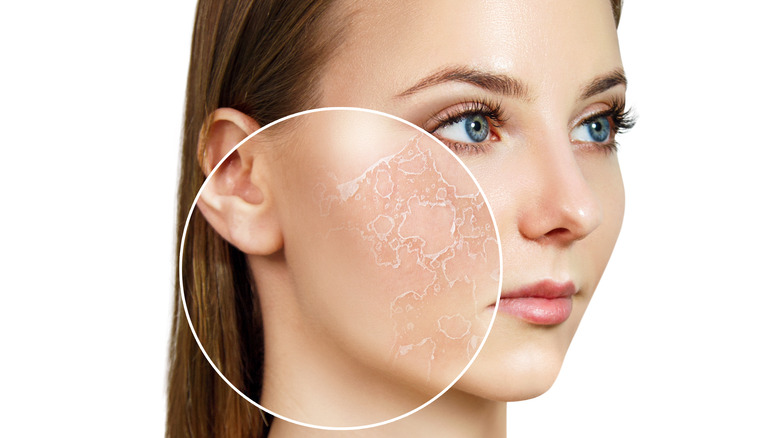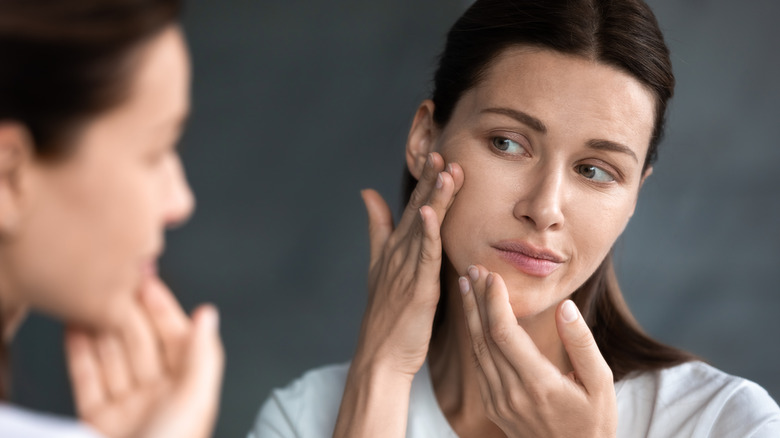The Best Ways To Treat Dry Or Dehydrated Skin
Dealing with dry skin is difficult any time of the year, but it becomes particularly taxing during the winter months when the air is colder and less humid. The whole ordeal is even more complicated if your skin transitions from being dry to being dehydrated, which is a totally different animal. According to Allure, dry skin is caused by a lack of oil and is accompanied by itching, flaking, and general discomfort. Dehydrated skin is characterized by tightness and a dull appearance. If the skin on your cheek wrinkles instead of bouncing back when you've pinched it, you likely have dehydrated skin.
Thankfully, the treatment options for both conditions are very similar. Determining what works best for you is a trial-and-error process, but once you find the combination of solutions with the greatest results, you'll be able to manage even the most uncomfortable areas with ease.
Here are some of the best ways to treat dry or dehydrated skin year round.
Look for the right moisturizers and invest in a humidifier
To treat dry or dehydrated skin, you need the right moisturizer. Allure recommended looking for moisturizers for your daytime and nighttime skincare routines containing one (or all) of the following ingredients: ceramides, emollients, and humectants. According to Sejal Shah, a dermatologist from New York, ceramides in particular "help the skin retain moisture and allow [for] proper function" (via Allure).
These ingredients — and moisturizing in general — hydrate your skin and fight irritation and dryness. The exact brand and type of moisturizer you use is going to vary based on your personal preferences, but remember to use separate items for each specific area of your body experiencing dryness. You'll need a separate body lotion to tackle dry and dehydrated skin on your arms or legs, but the options you choose should still contain the same helpful ingredients as your face moisturizer.
Investing in a humidifier is another great way to treat affected skin when you're experiencing dryness and dehydration (per Healthline). Electric and gas heat strip moisture from the air during the winter months, but using a humidifier set to a 60% level combats dryness and helps replenish moisture in the top layer of your skin (per Harvard Health).
Exfoliate, hydrate, and use the best serums for your skin
In addition to moisturizing your skin and using a humidifier, one of the best ways to treat dry or dehydrated skin is to exfoliate the affected area at least once a week (per Allure). When you exfoliate, you remove dead skin cells that have built up over time. The longer these cells build up, the more likely you are to experience skin conditions such as dryness. This is because the dead skin cells essentially prevent your skin from absorbing moisturizers properly, which perpetuates the issue.
Use an exfoliant with alpha hydroxy acids if you have sensitive skin, and use a physical exfoliator if you have oily skin to achieve the best results. Otherwise, the type of exfoliator you use is up to you! When it comes to serums though, look for a hyaluronic acid serum regardless of your skin type. This provides another layer of hydration to your skin in addition to the benefits you receive from your moisturizer.
Speaking of hydration, make sure you're hydrating properly throughout the day. Many skin conditions crop up as the result of internal issues, and dry or dehydrated skin may be caused by a lack of water intake (per GQ). To ensure you're drinking enough water throughout the day, follow dermatologist Dr. David Lortscher's advice. "If you're doing the following three things, you won't need to worry about dehydration: Making water your main choice of drink, drinking water when thirsty, and drinking water with meals," Lortscher, a board-certified dermatologist, said.


